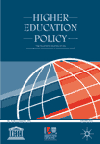
Power, assumptions and prescriptions: a critique of widening participation policy-making
Author: Thomas L.
Source: Higher Education Policy, Volume 14, Number 4, December 2001 , pp. 361-376(16)
Publisher: Palgrave Macmillan
Abstract:
This article focuses on widening participation in higher education by “non-traditional”, and currently under-represented, social and cultural groups in the UK. Although the barriers to access are complex and dynamic, this paper categorises the impediments to participation in post-compulsory education, and discusses the role of certain kinds of assumptions in developing policy solutions of limited effectiveness. In particular, it is concerned that dominant discourses display a propensity to make a series of untested assumptions, and reduce problems to a small number of issues, and to provide a “one-size-fits-all” solution. The UK government's proposals contained in the Excellence Challenge are examined, and underlying assumptions are identified: it assumes that the targeting and selection of pupils will be effective, and that all pupils will benefit equally from participating in the same activity. The limitations of these assumptions are illustrated by examining empirical research conducted by the author.© 2001 International Association of Universities. Higher Education Policy Vol. 14, (2001) 361–376Document Type: Research article
DOI: 10.1016/S0952-8733(01)00026-5
Publication date: 2001-12-01
- In this: publication
- By this: publisher
- In this Subject: Education
- By this author: Thomas L.

 Shopping cart
Shopping cart
 Receive new issue alert
Receive new issue alert